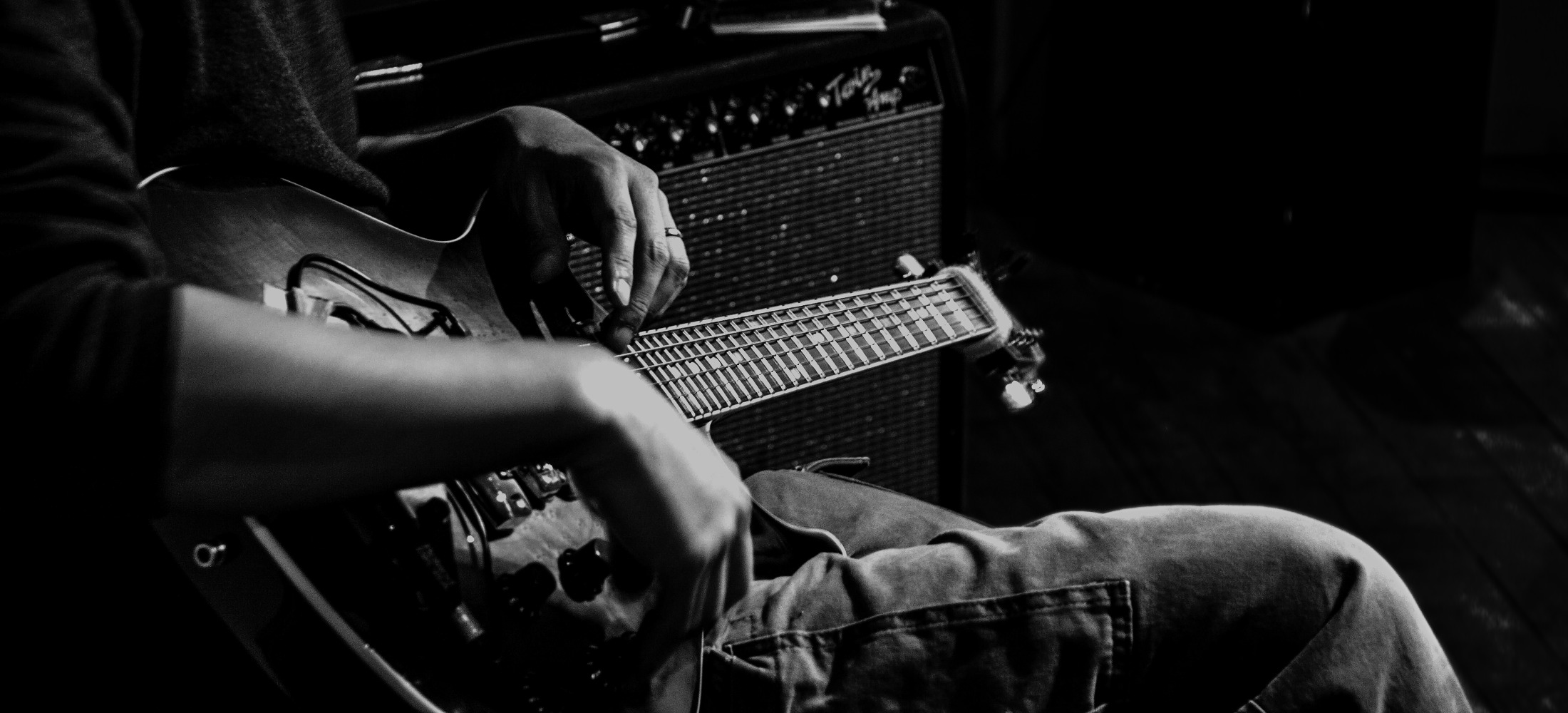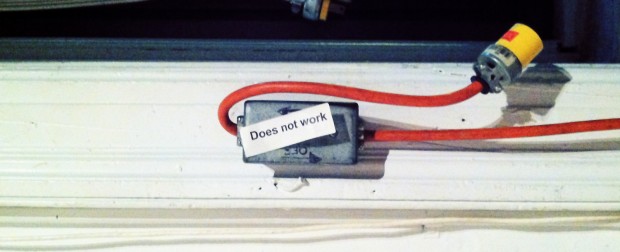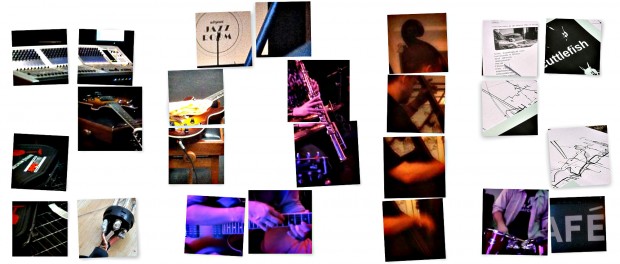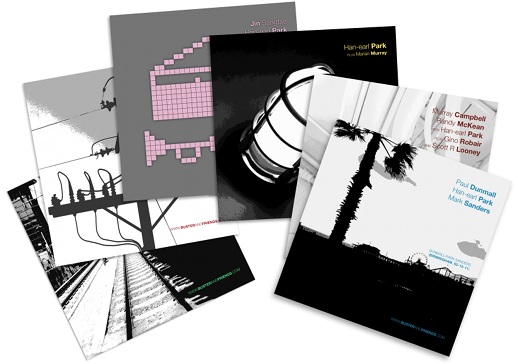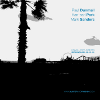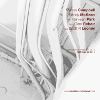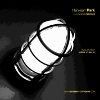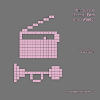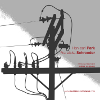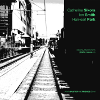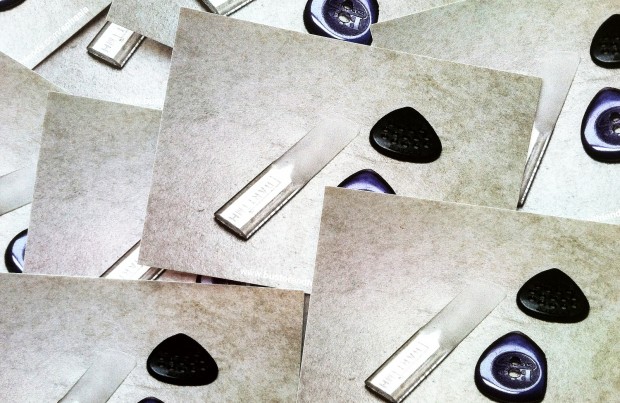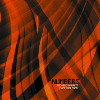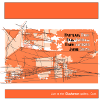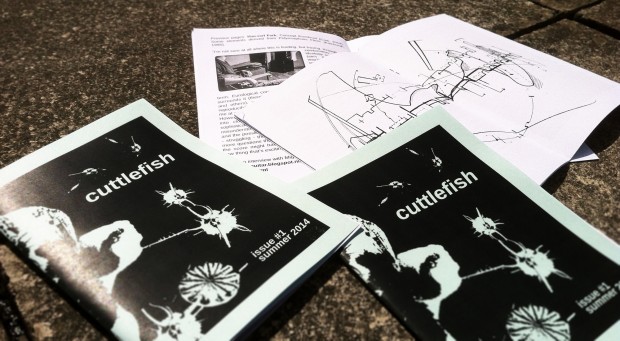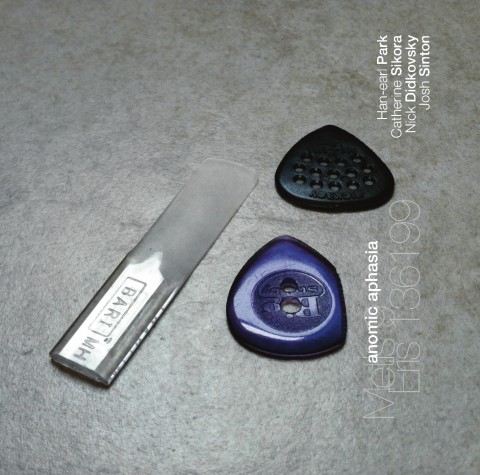
February 23, 2015: SLAM Productions releases ‘Anomic Aphasia’ (SLAMCD 559) featuring the ensemble Eris 136199 (Nick Didkovsky, Han-earl Park and Catherine Sikora), and rendering of improvisative tactics Metis 9 by Park, Sikora and Josh Sinton. [SLAM Productions catalog page…] [Discography entry…]
The CD is available from Downtown Music Gallery, Wayside Music, Disk Union… and all AWESOME record stores.
[Get the CD from SLAM Productions…]
[Downtown Music Gallery…] [Wayside Music…] [Disk Union…] [Improjazz…] [Crazy Jazz…] [Jazzcds…] [Proper Music (distributor)…] [More stores…]
[Download from iTunes…]* [eMusic…]*
* Downloads, in contrast to the physical CDs, do not include the liner notes.
news and updates
[All articles on Anomic Aphasia…]
description
Challenging and phenomenal works with the musicians playing off of each others ideas…. A beautiful noise. [More…]
Putting this unlikely lineup together was almost as brilliant as the recording they have produced…. ‘Free’ is a barely sufficient to describe this approach, as the trios explore various angular constructs and effects. The vocabulary of sounds here is as broad as it is unconventional. [More…]
— Mike Borella (Avant Music News)
Impressive in scale, overwhelming in execution, it’s a cyclic frenzy of fragmented sounds without an ounce of entropy, yet somehow with a sense of clear movement and progression. Warning: close listening can produce altered states…. [More…]
— Dave Foxall (a Jazz Noise)
彼らは一緒になって、描き上げたばかりの集合肖像画に点を穿ち、所々に飛沫を散らし、時には引き裂く。そして切り取り、並べ替え、分割する。 [More…]
— Cisco Bradley (JazzTokyo)
Atmospheric as to become almost frightening [More…]
— Ken Waxman (The New York City Jazz Record)
Ein glorioser Bastard aus Noise und süßer Träumerei. [More…]
— Rigobert Dittmann (Bad Alchemy)
Anomic Aphasia documents two New York-based projects: the noisy, unruly complexity of the ensemble Eris 136199; and the interactive playbook Metis 9, a collection of improvisative tactics. Guitarists Han-earl Park (Mathilde 253) and Nick Didkovsky (Doctor Nerve), and reedists Catherine Sikora (Clockwork Mercury) and Josh Sinton (Ideal Bread) render a space of unexpected collisions, weaving orbital paths, and playful discord.
Eris 136199 plays on the crossroads of noise, melody, rhythm, space, density, contrast, synchronicity, asymmetry, serendipity and contradiction. Eris 136199 is the noisy, unruly complexity of composer, computer artist and guitarist Nick Didkovsky, the corporeal, cyborg virtuosity of constructor and guitarist Han-earl Park, and the no-nonsense melodic logic of composer and saxophonist Catherine Sikora.
Together, Didkovsky, Park and Sikora forges an improvisative space where melody can be melody, noise can be noise, meter can be meter, metal becomes metal, bluegrass turns to bluegrass, jazz transforms into jazz, all there, all necessary without imploding under idiomatic pressures.
Metis 9 is a collection of improvisative tactics, and higher-level interactive macros for ensemble performance designed, designated and specified by Han-earl Park in collaboration with Josh Sinton and Catherine Sikora.
Metis 9 has ‘glorious noise’ or ‘frenzy’ at its root, yet it is not so much structuring the noise as it is a meta-layer of complexity that performers can introduce at will. Metis 9 does not tell the performer what to play, or provide all the details of how to interact, but it is an additional network protocol for interactive possibilities. Group improvisation is always the primary protocol; Metis 9 provides secondary or tertiary tactics that create an additional focused complexity. The decision for each bloop and bleep is still retained by the ensemble. These macros enable specific interactionist schemes to be expressed in an open improvisative context; it is improvisative play channeled by group consent.
trailer
personnel
Han-earl Park (guitar), Catherine Sikora (tenor and soprano saxophones), Nick Didkovsky (guitar; tracks 1 and 5), and Josh Sinton (baritone saxophone and bass clarinet; tracks 2–4).
track listing
Monopod (27:19), Pleonasm (Metis 9) (17:08), Flying Rods (Metis 9) (7:41), Hydraphon (7:34), StopCock (10:54). Total duration: 70:33.
recording details
Tracks 1 and 5: music by Eris 136199 (Nick Didkovsky, Han-earl Park and Catherine Sikora). Tracks 2–4: music by Han-earl Park, Catherine Sikora and Josh Sinton. Tracks 2–3: tactical macros (‘Metis 9’) devised and specified by Han-earl Park.
Tracks 1 and 5 recorded live at Douglass Street Music Collective, Brooklyn on June 5, 2013. Recording engineered by Scott Friedlander.
Tracks 2–4 recorded live at Harvestworks, New York City on October 29, 2013. Recording engineered by Kevin Ramsay. Mixed by Han-earl Park.
Design and artwork by Han-earl Park.
Thanks to Scott Friedlander, Kevin Ramsay, Carol Parkinson, Hans Tammen, Melanie L Marshall, Caroline Pugh, Richard Barrett, Ras Moshe, John Pietaro, Shayna Dulberger and Emilio Vavarella.
© 2015 Han-earl Park. ℗ 2015 SLAM Productions.
about the performers
Improviser, guitarist and constructor Han-earl Park (박한얼) has been crossing borders and performing fuzzily idiomatic, on occasion experimental, always traditional, open improvised musics for twenty years. He has performed in clubs, theaters, art galleries, concert halls, and (ad-hoc) alternative spaces across Europe and the USA.
Park engages a radical, liminal, cyborg virtuosity in which mind, body and artifact collide. He is driven by the social and revolutionary potential of real-time interactive performance in which tradition and practice become creative problematics. As a constructor of musical automata, he is interested in partial, and partially frustrating, context-specific artifacts; artifacts that amplify social relations and corporeal identities and agencies.
Ensembles include Mathilde 253 with Charles Hayward and Ian Smith, Eris 136199 with Nick Didkovsky and Catherine Sikora, and Numbers with Richard Barrett. Park is the constructor of the machine improviser io 0.0.1 beta++, and instigator of Metis 9, a playbook of improvisative tactics. He has performed with Wadada Leo Smith, Paul Dunmall, Evan Parker, Lol Coxhill, Mark Sanders, Josh Sinton, Louise Dam Eckardt Jensen, Gino Robair, Tim Perkis, Andrew Drury, Pat Thomas and Franziska Schroeder, and as part of large ensembles led by Wadada Leo Smith, Evan Parker and Pauline Oliveros.
Festival appearances include Freedom of the City (London), Sonorities (Belfast), ISIM (New York), dialogues festival (Edinburgh), CEAIT (Los Angeles) and Sonic Acts (Amsterdam). His recordings have been released by labels including Slam Productions, Creative Sources and DUNS Limited Edition.
Park taught improvisation at University College Cork, and founded and curated Stet Lab, a space for improvised music in Cork.
Since making her way to New York City from West Cork, Ireland to study abstract improvisation, Catherine Sikora has become a well-known face and sound in New York creative music circles. She has worked with Elliott Sharp, Eric Mingus, Michael Evans, Enrique Haneine, Karl Berger, Matt Lavelle, Jeremy Bacon, François Grillot and Burnt Sugar The Arkestra Chamber, among many others. Her undeniably unique approach sets her apart from everyone else, even when surrounded by the most original and creative voices in New York City. Sikora is a contributing writer to the book “Silent Solos-Improvisers Speak” (Buddy’s Knife Publishing, Köln, DE).
Current working projects include Clockwork Mercury (duo with Eric Mingus) and an improvising duo with drummer Brian Chase; Sikora’s first solo recording will be released in fall 2015.
“Sikora is a free-blowing player’s player with a spectacular harmonic imagination and an evolved understanding of the tonal palette of the saxophone.”
— Chris Elliot (Seacoast Online)
With a musical career spanning 30 years, Nick Didkovsky is a guitarist, composer, and music software programmer. He founded the rock band Doctor Nerve in 1983 and is a member of the Fred Frith Guitar Quartet. He has composed for Bang On A Can All-Stars, Meridian Arts Ensemble, ETHEL, and others. His compositions and guitar work appear on over 50 records.
His Black Sabbath Guitar Lessons on YouTube have been received with great enthusiasm by metal fans all over the world. His metal band Häßliche Luftmasken premiered in June 2011.
With computer music pioneer Phil Burk, Didkovsky created Java Music Specification Language which is used by composers all over the world. He has taught JMSL at Dartmouth College, CalArts, Columbia University, and NYU. With composer Georg Hajdu, he has created MaxScore, an object that uses JMSL to bring music notation to Max/MSP.
His Punos Music record label serves up his more extreme musical projects.
Brooklyn-based saxophonist/clarinetist/composer Josh Sinton is probably best known as the leader of Ideal Bread, the Steve Lacy repertory band. He also performs regularly with Andrew D’Angelo’s DNA big band, Darcy James Argue’s Secret Society, the Nate Wooley Quintet and Anthony Braxton’s Tricentric Orchestra. He’s played with avant-garde luminaries such as Roswell Rudd, Karl Berger and John Butcher, newer voices Ingrid Laubrock, Matana Roberts and Jeremiah Cymerman and pop singers Michael Buble and Norah Jones.
In 2012, Sinton released his autobiographical album Pine Barren (featuring Jon Irabagon, Jonathan Goldberger, Peter Bitenc and Mike Pride) with accompanying essays on the Prom Night Records label to critical acclaim (“deeply confessional and emotionally revealing” – Shaun Brady, Downbeat, Nov. 2012). This year he will release another record on Prom Night, anomonous on which he freely improvises on the amplified contrabass clarinet with Denman Maroney (hyperpiano) and Ben Miller (electronics). Currently he’s in the midst of finishing arrangements for the next Ideal Bread record, an ambitious re-recording of all the material Steve Lacy put out on the Saravah label in the 1970’s and was recently repackaged as Scratching the Seventies. The working title of this work-in-progress is Beating the Teens.
Sinton grew up in the Pine Barrens of southern New Jersey, came of musical age attending AACM classes in Chicago and completed his classroom education in Boston at the New England Conservatory of music. Along the way, he’s toured and played in India, Israel, Japan, France, Germany, the Netherlands and Finland. Currently he happily resides in Brooklyn, NY with his wife Laura and daughter Zosia.
Also available as part of…
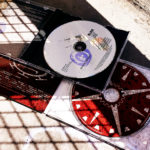
The Complete Eris 136199 on CD
Limited number of Eris 136199’s two CDs at a special price.
• Eris 136199 (BAF001, 2018).
• Anomic Aphasia (SLAMCD 559, 2015) with Josh Sinton.
Also by Eris 136199…
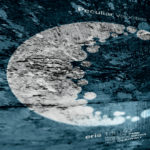
Peculiar Velocities (BAF002) [details…]
Personnel: Han-earl Park (guitar), Catherine Sikora (saxophone) and Nick Didkovsky (guitar). [About this ensemble…]
© + ℗ 2020 Han-earl Park.
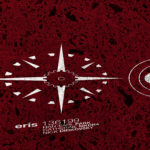
Eris 136199 (BAF001) [details…]
Personnel: Han-earl Park (guitar), Catherine Sikora (saxophone) and Nick Didkovsky (guitar). [About this ensemble…]
© + ℗ 2018 Han-earl Park.
Also from SLAM Productions…
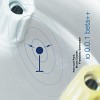
io 0.0.1 beta++ (SLAMCD 531) [details…]
Performers: io 0.0.1 beta++ (itself), Han-earl Park (guitar), Bruce Coates (alto and sopranino saxophones) and Franziska Schroeder (soprano saxophone). [About this project…]
© 2011 Han-earl Park.
℗ 2011 SLAM Productions.
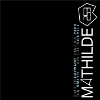
Mathilde 253 (SLAMCD 528) [details…]
Performers: Charles Hayward (drums, percussion and melodica), Han-earl Park (guitar) and Ian Smith (trumpet and flugelhorn) plus Lol Coxhill (saxophone). [About this ensemble…]
© 2010 Han-earl Park.
℗ 2010 SLAM Productions.
updates
03–06-15: add news and updates feed.
04–22-15: add purchase links (Improjazz, Crazy Jazz, Jazzcds, Proper Music, iTunes and eMusic).
06–02-15: add Disk Union link.
08–13-15: add Wayside Music link.
08–15-15: add new video trailer.
09–18-15: add Downtown Music Gallery link.
09–23-15: update Downtown Music Gallery link.
11–24-16: added reviews.
03–24-19: added BAF001 album.
11-02-20: update discography with the addition of Peculiar Velocities.
